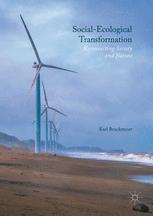

Most ebook files are in PDF format, so you can easily read them using various software such as Foxit Reader or directly on the Google Chrome browser.
Some ebook files are released by publishers in other formats such as .awz, .mobi, .epub, .fb2, etc. You may need to install specific software to read these formats on mobile/PC, such as Calibre.
Please read the tutorial at this link: https://ebookbell.com/faq
We offer FREE conversion to the popular formats you request; however, this may take some time. Therefore, right after payment, please email us, and we will try to provide the service as quickly as possible.
For some exceptional file formats or broken links (if any), please refrain from opening any disputes. Instead, email us first, and we will try to assist within a maximum of 6 hours.
EbookBell Team

4.8
84 reviewsThis book advances a social-ecological theory to reconnect nature and society through sustainable transformation of interacting social and ecological systems. Social ecology develops as an interdisciplinary science by using knowledge from the social sciences, especially sociology and economics, and from natural-scientific ecology. Knowledge integration across the boundaries of social and natural sciences is not widespread, blocked by the specialisation of theories and their competing forms of explanation and interpretation. Chapters in this book describe a new social-ecological theory that connects concepts and theories from both sides to create a new interdisciplinary theory. Inter- and transdisciplinary knowledge synthesis creates possibilities to analyse global environmental problems more systematically by integrating specialized research on environmental problems. The author uses social-ecological theory to analyse and explain problems and processes of global change in modern society such as climate change and adaptation to it, ecosystem change, and transformation of the industrial energy regime , finally offering pathways of transformation to a future sustainable society.